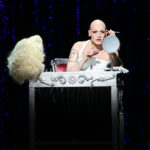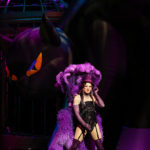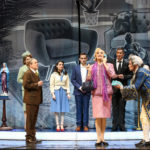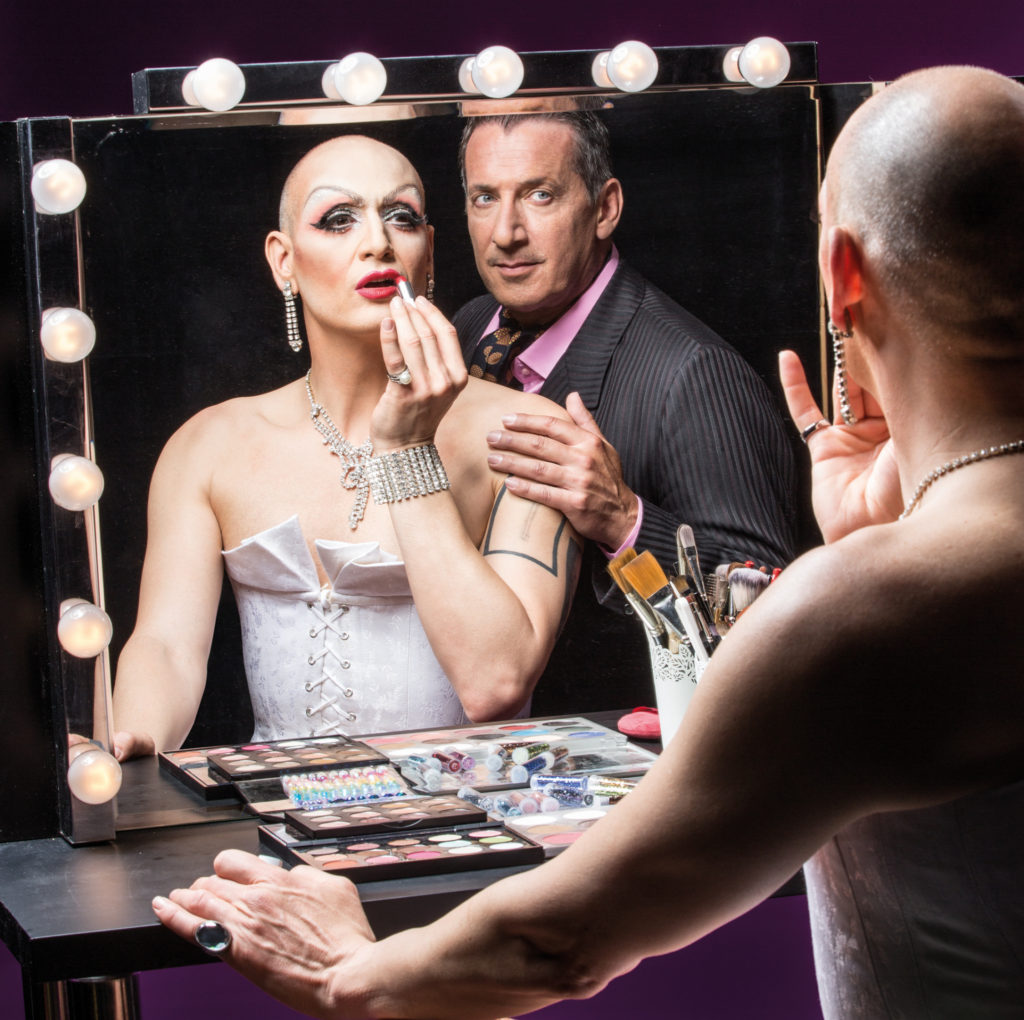
But where’s Zaza? Zaza komm sofort, zur Bühne. With (500) paying guests, she’s gone missing, preparing lunch in their next-door apartment. Albin’s had a jealous fit, and Georges has to calm and cajole him, There’s nobody but you. In Volksoper’s stage design (Stephan Prattes), their ‘lounge’ is a brilliantly coloured tapestry, a surreal, bourgeois scene. There’s a bright red couch, so period 70s, it’s in fashion.
Drew Sarich’s Albin is in his dressing room. His ‘aria’ Mascara is a tribute to drag artists. When depressed he looks in the mirror: and with each dash of eyeliner, he/she regains confidence. Sarich  identifies with Zaza, (in Volksoper’s interview), both vulnerable and wild extrovert. (What is Albin really? Transsexual, or a gay man that simply enjoys dressing up in drag?) Whatever, Sarich’s performance is a tour de force: both both sensitive, and explosive stage presence. And Sarich is also ideally cast: Zaza’s voice husky in the German cabaret (Amanda Lear, Hildegarde Kneff) tradition.
identifies with Zaza, (in Volksoper’s interview), both vulnerable and wild extrovert. (What is Albin really? Transsexual, or a gay man that simply enjoys dressing up in drag?) Whatever, Sarich’s performance is a tour de force: both both sensitive, and explosive stage presence. And Sarich is also ideally cast: Zaza’s voice husky in the German cabaret (Amanda Lear, Hildegarde Kneff) tradition.
In the next spectacular, ‘Justice’, he’s surrounded by ‘clerks’ in black, silver-lined cloaks. So camp! Then the arrival of their son, Jean-Michel (George’s from a previous ‘lapse’). Oliver Liebl, in a silver-grey suit and black t-shirt, looks older than a 20 year old (24). Liebl, (Macron-look-a-like), good looking, slight build, a very pleasant tenor, he really can sing.
Papa, I’m getting married! He’s in love with Anne (Juliette Khalil), daughter of an ultra-right wing politician, (‘The Tradition, Family and Morality Party’.) The nub of the plot is she’s arriving with her parents to meet Jean-Michel’s family. So JM wants the camp decor toned down, and Albin to stay away. He’s overheard by their ‘butler’/maid (Jurriaan Bles), standing in a pink wig and black suspenders.
Liebl’s sings of the love of his life, with Anne on his arm, the pretty, petite Juliette Khalil.
Jean-Michel hasn’t seen his ‘biological’ mother for 20 years, meanwhile Albin will have to stay in a hotel. ‘I love women too, but I don’t marry them’, retorts Sarich. ‘What have we done wrong?
Zaza in the Park with George. In one of the show’s more lyrical, romantic numbers, Georges reminds Albin of an afternoon on a bench that Autumn. Song of the Sands: It was the beginning of September, young and in love. He tells Albin about the wedding, but can’t bring himself to tell him to stay away. This man – father/mother- to whom they all owe everything.
The unsuspecting Albin performs Zaza’s big number La Cage aux Folles, (Cage of Fools), while Jean cleans Georges’ apartment to make it respectable. He’s sorry, Georges tells Albin … Who pre-empts him, Zaza has to be on stage. In a stunning canary-yellow gown, Sarich begins softly, and builds to a soaring climax, Ich bin was ich bin… To an empty stage. And what I am is extraordinary. I will love. I live for myself. I am what I am, is no secret. And in the drag tradition, throws off his wig. Sarich attains an overwhelming peak of emotion, with unexpectedly powerful vocal reserves. A great performance.
In a stunning canary-yellow gown, Sarich begins softly, and builds to a soaring climax, Ich bin was ich bin… To an empty stage. And what I am is extraordinary. I will love. I live for myself. I am what I am, is no secret. And in the drag tradition, throws off his wig. Sarich attains an overwhelming peak of emotion, with unexpectedly powerful vocal reserves. A great performance.
The script is witty, even Volksoper’s German version of Herman/Fierstein’s libretto; the issues of gender moulding and ‘conversion therapy’ still very topical, but treated humorously.
Albin, and the Butler, both in black veils, wander around mourning: until Georges decides to present Albin as ‘Uncle Albert’. So Georges coaches him to behave like a ‘proper man’. Du bist ein Mann! George’s gender-bending is hilarious- think of John Wayne- and gradually, in the Masculinity scene, Sarich’s ‘mince’ is straightened out.
It’s funny, but insulting to those many forced to change. Jean-Michel is shocked by the be-suited, straight, stranger ‘Albert’. But chided by Georges to remember how, then, when his gay parents defied local gossip.
The arrival of the Dindons, Anne’s parents, takes the comedy to another level. (Dindon’s French for ‘turkey’.) Robert Meyer (Volksoper Intendant) as Dindon, plays it straight, heightening the satire. ‘Is that a night club underneath?’- ‘We have nothing to do with them.’ Marie Dindon (Sigrid Hauser) compliments the sober ‘ecclesiastical’ decor. After her no-show, Albin decides to turn up as the supposedly ‘unavailable’ mother. The Dindons are taken in. In pink costume, Sarich looks uncannily like Marie Le Pen! Until Albin’s wig falls off. And it degenerates into high farce, as the stage opens up into the underground club, and we’re into an S and M medley.
 Homosexuelle!, Meyer repeats it venomously. But Anne will stay with them anyway. And Jean-Michel apologises for his behaviour- not to the Dindons- but to his gay parents. Meyer’s shown the door: to awaiting press cameras and paparazzi. Dindon’s blackmailed into accepting, sanctioning the marriage.
Homosexuelle!, Meyer repeats it venomously. But Anne will stay with them anyway. And Jean-Michel apologises for his behaviour- not to the Dindons- but to his gay parents. Meyer’s shown the door: to awaiting press cameras and paparazzi. Dindon’s blackmailed into accepting, sanctioning the marriage.
Now Das Finale, the Cagelles, are revealed in their glittering G-strings, in the comedy’s unconventional reconciliation. Anne has decided to join the troupe. Then Marie Dindon. And finally Meyer appears in an outrageous rainbow-coloured Elizabethan gown. The revelry is OTT, the audience joining in with syncopated clapping. The House was packed, the whole Vienna audience in tune with Lorenz C. Aichner’s swinging Volksoper orchestra, on their feet.
It’s come a long way from Jean Poiret’s stage play, Molinaro’s French (1978) Oscar-winning movie; to Herman/Fierstein’s 1983 Broadway hit musical, then an affirmation of gay liberation. I Am What I Am, the gay anthem of the 80s, still resonates. But the musical has become mainstream, middle-class audience older, self-congratulatory. That’s a tribute to Herman’s musical score, La Cage’s classic status.
Jerry Herman, famed for Hello Dolly, Mame – the first Broadway composer to come out- with playwright Harvey Fierstein, reworked a French farce with real gay characters. And brilliantly set it to music. 1983 Broadway premier predated Aids; and yet such is the melding of classic musical and brilliantly crafted comedy, even 40 years on, it still cuts it. © PR.6.5.2022
Photos: Drew Sarich (Albin/Zaza); Drew Sarich (Zaza); Sigrid Hauser (Marie Dindon), Robert Meyer(Edouard Dindon), Juliette Khalil (Anne), Oliver Liebl (Jean-Michel), Drew Sarich (Albin), Victor Gernot (Georges), Jurriaan Bles (butler) © Barbara Pálffy/Volksoper/Wien


If you thought you’ve seen it all online, think again! This website redefines awesome. Don’t miss out!